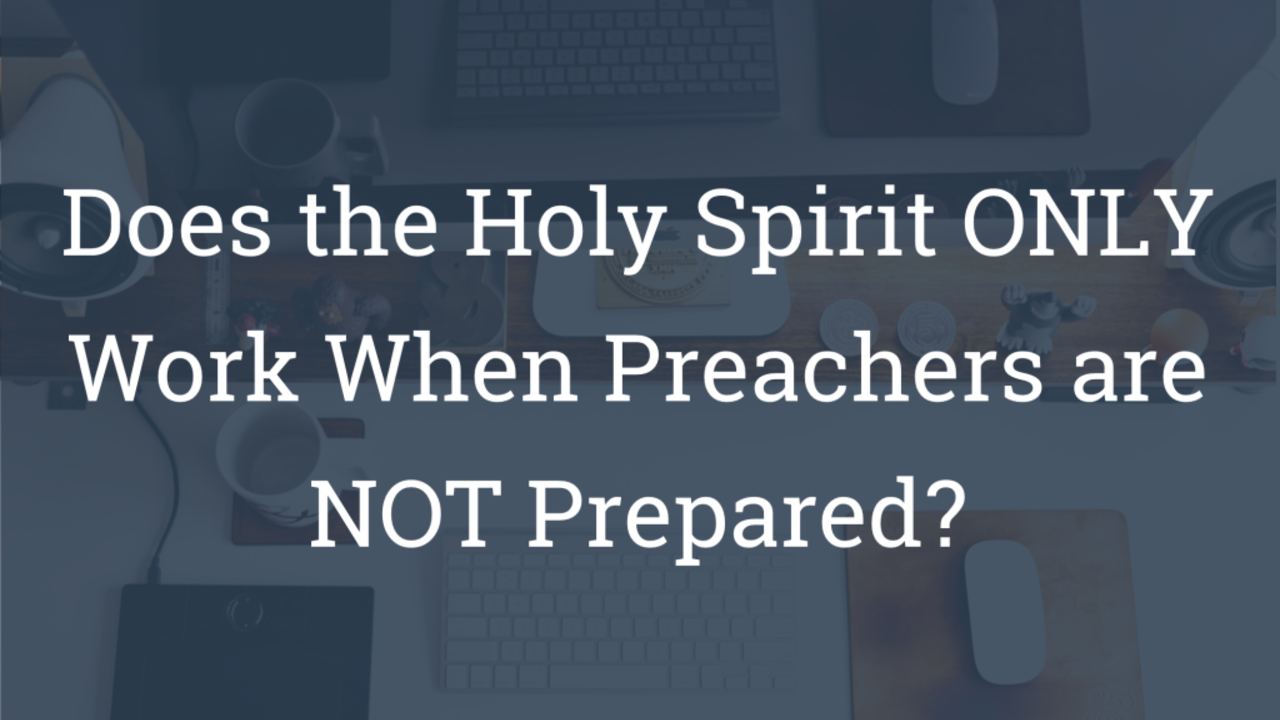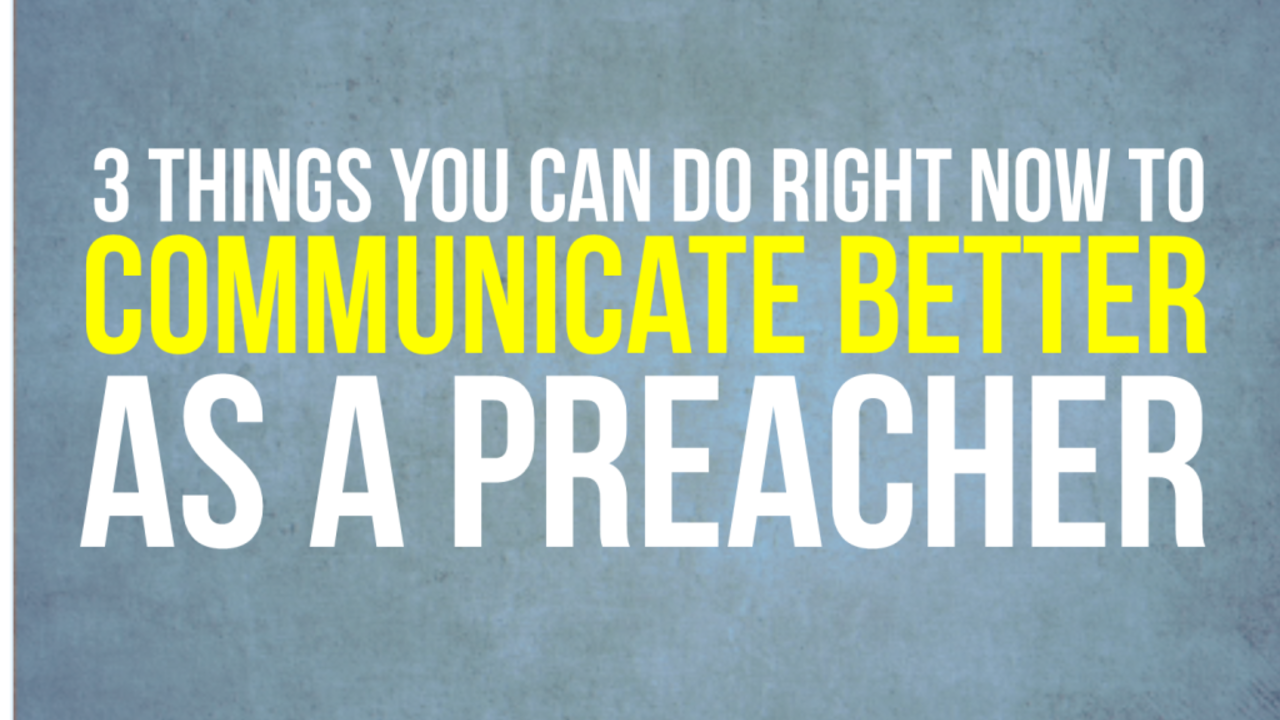The Preacher’s Guide to Preparing Sermons in a Team

This was originally posted on Preaching Donkey as a 3-part series. I’m re-posting it today because the practice of team preparation has been so instrumental in my own preaching experience. If you are not yet using a team to prepare I hope to convince you to get started. It changes everything! I would love to hear from you in the comments. Thanks for reading.
Preachers do weird things. One weird thing we do is prepare our sermons alone. Every week you have to get up in front of a group of people and say words. Those words have to be engaging, powerful, motivating, encouraging, accurate, practical and spiritual all at the same time.
Every. Single. Week.
And you prepare alone. All by yourself. I think this started with Moses. He went up on a mountain and heard from God. He came down and told the people, “This is what God said.” We’ve never really changed the model. Preachers have been preparing sermons alone ever since.
I used to prepare my sermons alone. I would read commentaries, ...
Pastors: 4 Things You Wish People Understood about You

“What do you do for a living?”
This seems like a simple question. When normal people are asked this at a party or in some other social setting by a person they’ve just met it is an invitation to more conversation. There’s any number of acceptable answers:
“I’m a consultant.” or “I work for a defense contractor.” 0r “I’m a web developer.”
When I’m asked the question, “What do you do for a living?” I know that what comes out of my mouth next, “I’m a pastor,” will produce one of the following outcomes:
1) It will kill the conversation immediately. We could be having a great conversation, even laughing, and then as soon as I come out with my man-of-the-cloth-ness, it’s over. They find a reason to be done talking to me.
2) The person I’m talking to will become the most religious person I’ve ever met. They’ll start saying things like, “The Lord is just really blessing us…. I see him everywhere…. as it says in the good book, God helps those who help themselves.” And other religious soun...
3 Things that Must be Clear Before your Sermon is Ready to Preach

A mist in the pulpit is a fog in the pew.“~C.H. Spurgeon
With each sermon you preach, you should be absolutely crystal clear what you want your people to take away from it. If you are murky about how they’ll be able to use your message, then you can be sure they’ll be clueless. Not to mention that they’ll pick up on your uncertainty and check out because their time is valuable and you have chosen to waste it.
As preachers who want to communicate well, clarity must be a top priority in every sermon. But it’s easy, and sometimes necessary, to focus a most of your prep time on your content and not your listeners. This makes it so crucial to think through how your listeners will receive and use your message. I want to give you three simple tests that will help you ensure that your sermon is ready to go in terms of its impact on your listeners and their ability to apply it.
This is drop-dead simple, and it’s meant to be. At this point in your prep you have already done the complicated st...
4 Things Competing for Your People’s Attention During Your Sermon

It’s more important than ever before to work on gaining and keeping the attention of your listeners while you preach. Capturing and maintaining attention is one of the most difficult things a communicator must do. But I don’t think this difficulty has much to do with attention span. Some will say that it’s just because people have shorter attention spans than a generation ago. While attention spans may be shorter, this doesn’t tell the whole story. I do believe shorter sermons are almost always better, but what makes them better has more to do with how it makes the preacher deliver a better sermon when he has less time to waste with filler, rambling, and incoherence.
The reason we have to work harder to gain and keep attention has to do with what competes for the attention of our people every time we preach. Our listeners are so distracted, and we need to know what we’re up against. Some of these distractions are new, and some are as timeless as humanity, but they are all present ever...
Five Ways to Overcome Preaching Distractions

Internal Distractions. These exist inside your head. Your mind goes a million miles an hour while you preach. You think about a lot of things in the moment:
-you wonder how your message is coming across
-you’re not sure if you’ve adequately made your point
-you realize you’re not actually living out what you’re preaching
-you think about the argument you had that morning with your wife
-you’re concerned someone might be thinking you’re preaching about them
-you realized you’ve talked yourself into a corner
-you wonder if everyone is bored and all of this goes on in your head while words are coming out of your mouth. It m...
Here’s to 6 Months of Preaching Donkey – Top 5 Posts of 2014

Preaching Donkey has been so much fun. I can’t believe it’s been around for six months! I started this blog on July 1, 2014 as a way to help preachers communicate better. I wanted to share some thoughts and start a conversation with other preachers and learn together. The response has blown me away! So far the blog has 31 posts with 17,739 page views. Over 10,000 people follow @PreachingDonkey on Twitter and 154 people like Preaching Donkey on Facebook. Preaching Donkey articles have been published on Sermon Central and Church Leaders several times. I never dreamed this little idea would take off like it has, but this is only the beginning!
I am truly grateful for you. Thank you for reading, commenting, and sharing Preaching Donkey with your friends. You are why Preaching Donkey will keep going into 2015 with even more helpful content for preachers who want to communicate better! I thought it would be fun to look back at the top five most viewed posts of this year.
Here’s to 6 Month...
Does the Holy Spirit ONLY Work When Preachers are NOT Prepared?

If you preach regularly you’ll resonate with this quip about sermon preparation, “Somebody’s gonna suffer. Either you do before, or they do during.” -Howard Hendricks
Sermon preparation is not an easy task. It takes great patience and the ability to stick through even when inspiration and creativity are lacking.
This is why I have written a lot of articles on sermon prep:
- Two Questions to Nail Down Before Every Sermon
- Here’s Why You Need a Weekly Sermon Prep Schedule
- Why You Should Prepare Sermons in a Team (3 part series)
- How to Preach Like You’re Having A conversation with Everyone in the Room
- How to Get More Helpful Feedback on Your Sermons
- Why Shorter Sermons are Almost Always Better
I know that sermon preparation can be vexing, and I want to help in any way I can. I also know how important it is to put in the necessary hard work and deliver a sermon that is worthy of a listen.
I get interesting feedback when I write about the importance of working hard at sermon prep...
3 Things You Can do Right Now to Communicate Better as a Preacher

The most effective preachers are continual learners. What separates ordinary preachers from extraordinary communicators is a relentless desire to improve. But there are so many things competing for your time it’s difficult to know which resources to take advantage of. To make it easier, I want to share 3 things you can do right now to communicate better as a preacher:
1. Read great preaching resources.
I once met with guy who was in his sophomore year in college. He felt a strong calling to be a pastor and wanted to know if he should change his major and pursue ministry as a career. I offered him some books to read that would help him think through his decision. He declined them, “I’m not much of a reader.”
“Well, then you won’t be much of a pastor.” I responded without thinking much about it.
He was surprised at my assessment that he should either become a reader or do something different for a living. I feel very strongly that those of us who preach have a responsibility to stay ...
Two Questions to Nail Down Before Every Sermon

To know if you were successful at something you’ve tried, you have to know what you were seeking to accomplish. This is true in every area of life but especially in preaching. This is why I nail down two questions before every sermon. These two questions are an essential part of my sermon preparation process, and I want to share them with you.
1. What is the objective for this sermon?
When you think back on a sermon you’ve preached you should know if you met your objective. Nothing is more frustrating than putting lots of work into a sermon and having no way to measure its effectiveness. But to assess the sermon you need an objective to measure it against. And to meet an objective, you must have an objective. So what exactly is a preaching objective?
A preaching objective is simply what you want the sermon to do. A sermon should be more of a verb than a noun. A sermon should work. It should accomplish things.
But your sermon only accomplishes what you make it accomplish. Your sermo...



